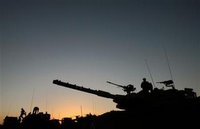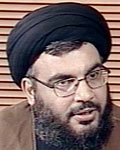Lebanon: The Warmonger's Playground
The crisis in West Asia has depended with Israel’s strengthened offensive in Lebanon and the Gaza Strip over the past week. Concerns are now being raised about this military offensive becoming a low grade war soon. The pretext for starting this offensive was the attack by Hezbollah on an Israeli envoy, inside Israel, and the subsequent capture of two of its troops. The Israelis retaliated with a show of force and have now expanded their military operations to end the Hezbollah and its strongholds in south Lebanon. The Israeli Defense Forces have also launched air attacks into Beirut and the civilian death toll from the attacks is close to 300. Also, 24 Israelis have lost their lives in rocket attacks by Hezbollah in the Israeli city of Haifa. The UN has predictably condemned both sides – the Hezbollah and the Israelis for this major flare up in the Middle East. This military conflagration has once again brought the sad history of Lebanon to the fore front.
 Israeli Tanks ready to cross into Lebanon
Israeli Tanks ready to cross into Lebanon
Lebanon has been the theater of war for decades. Right since the country was carved out from the Ottoman Empire, it has been involved in an armed conflict and repeated ground invasions from its neighbors. More recently, the country was totally demolished, economically and infrastructurally, by the civil war that lasted from 1975 to 1990. In the mid eighties it became the staging ground for the Palestinian Liberation Army under the leadership of Yaseer Arafat and had to suffer repeated Israeli offensives as a result. Further, till the Cedar Revolution of last year, that followed the assassination of ex Prime Minister Rafiq Hariri, the Syrians were the de facto rulers of the country. The country also became the hub for the Shia militant group the Hezbollah, which received backing from the Iranians. The charter of Hezbollah, much like that of Hamas, called for the destruction of Israel and the fight for the rights of the Palestinian people. This current conflict, however, has less to do with solidarity for the Palestinian cause and more to do with the geo-political powerplay the West and the regional powers are indulging in.
 Israeli Tanks ready to cross into Lebanon
Israeli Tanks ready to cross into LebanonLebanon has been the theater of war for decades. Right since the country was carved out from the Ottoman Empire, it has been involved in an armed conflict and repeated ground invasions from its neighbors. More recently, the country was totally demolished, economically and infrastructurally, by the civil war that lasted from 1975 to 1990. In the mid eighties it became the staging ground for the Palestinian Liberation Army under the leadership of Yaseer Arafat and had to suffer repeated Israeli offensives as a result. Further, till the Cedar Revolution of last year, that followed the assassination of ex Prime Minister Rafiq Hariri, the Syrians were the de facto rulers of the country. The country also became the hub for the Shia militant group the Hezbollah, which received backing from the Iranians. The charter of Hezbollah, much like that of Hamas, called for the destruction of Israel and the fight for the rights of the Palestinian people. This current conflict, however, has less to do with solidarity for the Palestinian cause and more to do with the geo-political powerplay the West and the regional powers are indulging in.
Hezbollah's Hasan Nasaralah

The American quagmire in Iraq seems to have no end in sight in the near future. The US has repeatedly blamed Syria and Iran for backing the Shia militias in Iraq and also for the failure of the unity government to take off in Baghdad. Iran, with all its military and economic might is looking to assert itself as the dominant voice of the Middle East. It has rallied the war cry against Israel, the only unifying stand that the entire Arab world agrees on, and the Iranian President has called Israel the “curse” that exists in the region. In a bid to bolster its credentials as a leader of sorts of the Arab voice, Iran is pushing and backing the Hezbollah and the Hamas to actively open fronts against the Israelis. The Syrians, the neighboring bete noire of Israel still have their Golan Heights under occupation by the Israelis after the 1967 Six-Day War. They are looking to get back at the Israelis by backing the Hezbollah in this proxy war of sorts. Also it is interesting that the Arab voice in this flare-up has been openly divided on the actions of the Hezbollah. Egypt, Saudi Arabia and Jordan have rightly voiced their disapproval of the Hezbollah action and that of its leader Hassan Nasaralah. This differing voice against another Arab player in the Israel-Arab conflicts is a sign of a deeper conflict of interest on both sides. The Egyptians, Saudis and Jordanians are worried about the growing influence of Iran in the region. It is no surprise that all three countries are majority Sunni and are opposing the Shia led Iran to contain its influence in the region. It marks the first time that the Middle East crisis has separated nations on Shia-Sunni lines. One can call this the ‘Iraq Effect’ where the ethnic divide has become s o acute that countries in the region are now actively supporting each other on the basis of their majority ethnicity. This divide, though regressive for the region, has a silver lining of sorts as it will actively prevent a full scale Israel versus the Arab world sort of a war to take place. But the threat of that peril still remains strong.
o acute that countries in the region are now actively supporting each other on the basis of their majority ethnicity. This divide, though regressive for the region, has a silver lining of sorts as it will actively prevent a full scale Israel versus the Arab world sort of a war to take place. But the threat of that peril still remains strong.
In the end this Israeli offensive on Lebanon and Beirut will continue for some time to come. Lebanon, though the unfortunate playground for regional wars, must share the blame for not doing enough to contain Hezbollah in its sovereign territory after the withdrawal of Israeli forces in 2000. Also, Lebanon has not gotten out the shadow of Syria and is still ‘guided’ by the Syrians on most issues. Till the time Lebanon is not able to contain terror groups from within its boundaries and become more independent of foreign influence it will be the victim of one war or the other. The mass evacuation of foreign nationals from Lebanon is an ominous sign of things to come, with the US virtually backing the Isrealis to go after Hezbollah, more war and bloodshed will come in the weeks ahead of a land fabled for its wonderful food and its beautiful Cedar trees.

The American quagmire in Iraq seems to have no end in sight in the near future. The US has repeatedly blamed Syria and Iran for backing the Shia militias in Iraq and also for the failure of the unity government to take off in Baghdad. Iran, with all its military and economic might is looking to assert itself as the dominant voice of the Middle East. It has rallied the war cry against Israel, the only unifying stand that the entire Arab world agrees on, and the Iranian President has called Israel the “curse” that exists in the region. In a bid to bolster its credentials as a leader of sorts of the Arab voice, Iran is pushing and backing the Hezbollah and the Hamas to actively open fronts against the Israelis. The Syrians, the neighboring bete noire of Israel still have their Golan Heights under occupation by the Israelis after the 1967 Six-Day War. They are looking to get back at the Israelis by backing the Hezbollah in this proxy war of sorts. Also it is interesting that the Arab voice in this flare-up has been openly divided on the actions of the Hezbollah. Egypt, Saudi Arabia and Jordan have rightly voiced their disapproval of the Hezbollah action and that of its leader Hassan Nasaralah. This differing voice against another Arab player in the Israel-Arab conflicts is a sign of a deeper conflict of interest on both sides. The Egyptians, Saudis and Jordanians are worried about the growing influence of Iran in the region. It is no surprise that all three countries are majority Sunni and are opposing the Shia led Iran to contain its influence in the region. It marks the first time that the Middle East crisis has separated nations on Shia-Sunni lines. One can call this the ‘Iraq Effect’ where the ethnic divide has become s
 o acute that countries in the region are now actively supporting each other on the basis of their majority ethnicity. This divide, though regressive for the region, has a silver lining of sorts as it will actively prevent a full scale Israel versus the Arab world sort of a war to take place. But the threat of that peril still remains strong.
o acute that countries in the region are now actively supporting each other on the basis of their majority ethnicity. This divide, though regressive for the region, has a silver lining of sorts as it will actively prevent a full scale Israel versus the Arab world sort of a war to take place. But the threat of that peril still remains strong.In the end this Israeli offensive on Lebanon and Beirut will continue for some time to come. Lebanon, though the unfortunate playground for regional wars, must share the blame for not doing enough to contain Hezbollah in its sovereign territory after the withdrawal of Israeli forces in 2000. Also, Lebanon has not gotten out the shadow of Syria and is still ‘guided’ by the Syrians on most issues. Till the time Lebanon is not able to contain terror groups from within its boundaries and become more independent of foreign influence it will be the victim of one war or the other. The mass evacuation of foreign nationals from Lebanon is an ominous sign of things to come, with the US virtually backing the Isrealis to go after Hezbollah, more war and bloodshed will come in the weeks ahead of a land fabled for its wonderful food and its beautiful Cedar trees.

0 Comments:
Post a Comment
<< Home